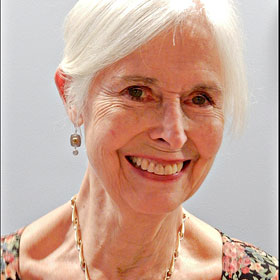The Amputated Memory by Werewere Liking;
Original title: La Mémoire Amputée
The Feminist Press, New York, New York: 2007
Translated from the French by Marjolijn de Jager
Unremembered
After reading the last paragraph of Werewere Liking’s latest novel, I closed the cover and exclaimed, “Well!” That’s not the most sophisticated response, but a more appropriate one for a tale that is, in a word, astonishing: visceral and lyrical, impudent and literate, straightforward but effortlessly and endlessly metaphorical. Liking is the multifaceted Cameroonian artist who paints, dances and sings as well as writes; with her fifth book, she synthesizes all those talents to craft a manifesto of African feminism that is likable, a rare quality for such an ambitious work.
Memory is a mostly linear narrative that shuttles freely between past and present, prose and Greek chorus-style poetry, story and soliloquy, always feeling much more buoyant than ambitious. This is because Liking centers the story and all its elements around the character of Halla Njokè, a young but precocious villager trying to define a voice and destiny in post-colonial Cameroon in the late 1950s and early 1960s. Halla is first a representation of Liking herself, and Memory is thus Liking’s own coming-of-age tale, which includes epiphanies (facilitated mostly by women in her extended family) about sex, spirituality, power and politics. But as the title suggests, Memory aims to be much more inclusive. In gathering together her own experiences, Halla is stitching together a great quilt for all the women of Africa whose personal histories have gone unrelated and unremembered for too long. This book is Liking’s passionate but very studied attempt to liberate from oblivion what she calls the continent’s chronically “suppressed memory” of its people, women in particular.
And liberating it is. For all its serious themes, this novel is a lot of fun; its tone is a kind of fantastic realism that recalls Candide and other archetypal tales about a seeker who encounters one strange circumstance after another. At various points Halla finds herself a housemaid, a mother, a Jehovah’s Witness minister and an underage nightclub singer who hardly knows what a nightclub is. Yet the book is not about the randomness of life, but about Halla’s growing realization that many aspects of her life are fixed, and why she must change them for her own benefit. That includes resolving a larger cultural struggle between old customs and new, which surfaces most painfully when Halla understands her beloved father is mostly interested in marrying her off to the highest bidder. Pondering when or if she will forge her own path, Halla suddenly and somewhat angrily turns her gaze outward. “How many lives collide with this same question and never find an answer?…” Liking writes. Placating you to stay there and submit, without daring to envision anything else at all. And you scrape along in melancholy for the rest of your life. You, for instance, you who are reading me at this very moment, can you truly declare that you are where you wanted to be all along?”
Touché. But for all the vexing questions asked – about the lot of African women, about the social and political turbulence that follow so-called independence in Cameroon – neither Liking nor her protagonist ever lose their mettle or their wonder at what is possible. Halla’s forbearance in the face of chaos and deception is heroic, but she is only one of several heroines illuminated here. In carefully assembling Africa’s severed memories, Liking has truly written herself – and countless other sisters – into existence.
– Erin Aubry Kaplan, for MS Magazine, Winter, 2008
Noma Award-winning novel called “a deeply felt presentation of the female condition in Africa.”
“….An expansive, eclectic, and innovative novel.”–Women’s Review of Books
A modern-day Things Fall Apart, The Amputated Memory explores the ways in which an African woman’s memory preserves, and strategically forgets, moments in her tumultuous past as well as the cultural past of her country, in the hopes of making a healthier future possible.
Pinned between the political ambitions of her philandering father, the colonial and global influences of encroaching and exploitative governments, and the traditions of her Cameroon village, Halla Njokè recalls childhood traumas and reconstructs forgotten experiences to reclaim her sense of self. Winner of the Noma Award—previous honorees include Mamphela Ramphele, Ngugi wa Thiong’o, and Ken Saro-Wiwa—The Amputated Memory was called by the Noma jury “a truly remarkable achievement . . . a deeply felt presentation of the female condition in Africa; and a celebration of women as the country’s memory.”
Since 1978, Cameroon-born artiste extraordinaire Werewere Liking has been living in the Ivory Coast, where she established the Village Ki-Yi, a self-supporting center for the performing and fine arts. A singer, dancer, actor, playwright, songwriter, and author of two titles previously published in the United States, Liking has been honored across the globe for her writing and theater work; she has performed at such venues as The Kennedy Center.
– Indigo Books – 2007

